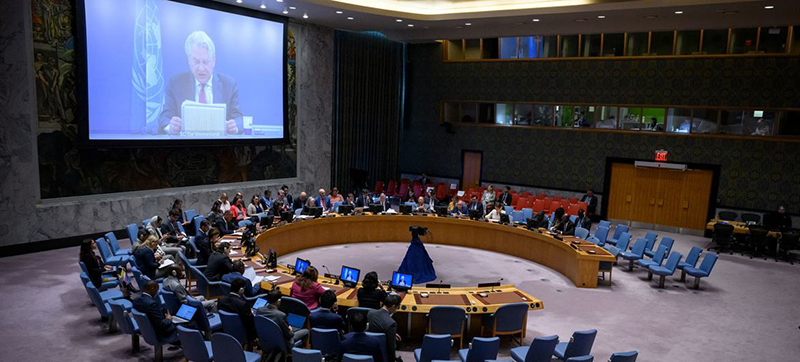Israeli-Palestinian death toll highest since 2005: UN envoy

More than 200 Palestinians and nearly 30 Israelis have been killed so far this year in demonstrations, clashes, military operations, attacks and other incidents, which already surpasses last year’s death toll, UN Middle East envoy Tor Wennesland said in a briefing to the Security Council on Monday.
It represents the highest number of fatalities since 2005 and reflects “concerning trends” seen in recent months throughout the Occupied Palestinian Territory
“Palestinians and Israelis are killed and injured in near daily violence – including just hours before this briefing when another fatal shooting attack killed an Israeli in the West Bank,” he said, speaking from Jerusalem.
Extremists taking advantage
The violence is fuelled and exacerbated by a growing sense of despair about the future, said Mr. Wennesland, whose official title is UN Special Coordinator for the Middle East Peace Process.
“The lack of progress towards a political horizon that addresses the core issues driving the conflict has left a dangerous and volatile vacuum, filled by extremists on both sides,” he told the Council.
“We are a long distance apart from the sentiments prevailing when the Oslo Accord was signed 30 years ago on 19 August.”
Although the parties have taken measures towards stabilizing the situation, “unilateral steps” continue, including Israeli settlement growth, demolitions, Palestinian militant activity, and settler violence.
Mr. Wennesland reiterated that all perpetrators must be held accountable and brought to justice. He also condemned violence against civilians, including acts of terror, and urged security forces to exercise maximum restraint and use of lethal force.
Gaza ceasefire holding
Meanwhile, a cessation of hostilities in Gaza continues to hold following the escalation in May. However, the humanitarian situation there remains dire.
Gazans have been facing higher-than-normal electricity shortages lasting up to 12 hours a day, amid lack of capacity to meet soaring summertime demands. Additional funding by Qatar has increased supply by nearly two hours a day.
The power cuts sparked mass protests against Hamas, which rules the Gaza Strip, under blockade now for over 17 years. Thousands took to the streets on 30 July, and videos showing Hamas security forces beating protestors were widely circulated. In response, Hamas led counter-protests against Israel.
Hamas also sentenced seven civilians in Gaza to death for collaborating with Israel. Mr. Wennesland underlined the UN’s strong opposition to the death penalty in any circumstances.
Turning to the wider region, he reported on incidents such as the deadly violence at the Ein el Hilweh Palestine refugee camp in southern Lebanon that erupted in late July. Clashes between Fatah and Islamist factions left 13 people dead and over 50 injured. He appealed for restraint and called for an end to any further violence.
Funding shortfalls affect millions
Mr. Wennesland also updated ambassadors on the dire fiscal state of the Palestinian Authority, which controls the West Bank. It has a projected deficit of more than $370 million this year.
"Austerity measures have resulted in significant reductions to civil servant salaries and social assistance,” he said.
Humanitarians also need funding for their activities across the region.
The UN agency that assists Palestinians, UNRWA, urgently requires $35 million to provided food aid to 1.2 million people in Gaza, while the World Food Programme (WFP) needs $41 million to restore its operations across the Occupied Palestinian Territory.
Furthermore, an overall $502 million humanitarian plan is only around 30 per cent funded, and he called for increased international support.



